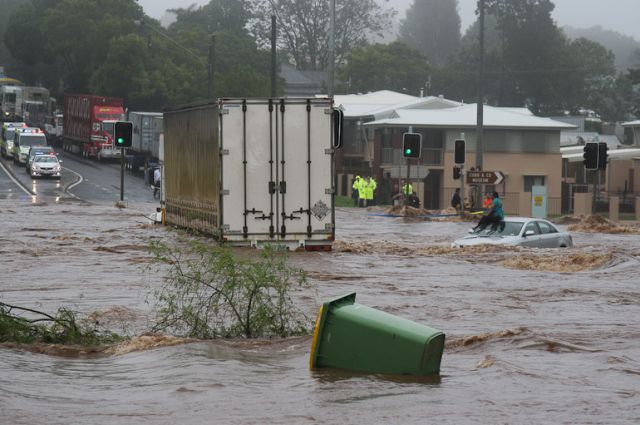
The flood disaster that struck three-quarters of Queensland over the past month and then spread to Victoria and Tasmania is the worst overall flood catastrophe in recorded Australian history. It has also inspired a massive outpouring of public sympathy and solidarity.
The disaster has shown in practice the huge potential for ordinary people to mobilise in support of fellow human beings in need of help.
Tens of thousands of Brisbane residents volunteered to help people whose homes had been flooded by the raging Brisbane River, especially over the weekend of January 15-16.
These actions undercut the argument that humanity will always be dominated by the selfish values encouraged in our normally class-ridden and money-centred capitalist society.
For a short time, we have seen that a cooperative, egalitarian socialist society is possible — if only the rule of corporate greed could be overcome by a new system based on social cohesion rather than conflict.
Unfortunately, that window into a possible future is now being closed with a return to the realities of neoliberal capitalism.
This is underlined by the big question of who will bear the main costs of recovery and reconstruction.
“Many homeowners — maybe half of them — do not have flood insurance, and many of those who do are underinsured,” said David Humphries in the January 15 Sydney Morning Herald.
"Governments will have a tough time persuading an insurance industry to cut the uninsured and underinsured some slack. 'If people do not purchase flood cover insurance, they will not be covered,' said a spokesman for the Insurance Council of Australia.”
Queensland Premier Anna Bligh told ABC Radio on January 14: “I call on insurance companies to act with compassion in the face of this event. It is not in the interests of anyone in our community, including those companies, to stall or delay recovery, but to show flexibility and compassion."
However, the word "compassion" seldom used by insurance company executives or the owners of big corporations. The word they know best is profit.
On January 17, Bligh announced a $15 million government inquiry to monitor how insurance companies meet claims by flood victims.
The January 18 Australian said: “Insurers are on notice they will be held to public account over their handling of Queensland flood claims after the state government announced an inquiry into the disaster and the commonwealth flagged reforms to insurance policy definitions.”
"The increased scrutiny comes amid concern over the multi million-dollar salary packages earned by top executives in the industry, including at prominent insurers QBE, Suncorp and IAG.
"Ingrid Just, spokeswoman for consumer group Choice, pointed to the disparity between high executive pay in the industry and the plight of policy holders: 'It's not going to sit well in the eyes of flood-affected families.’”

One point of contention will be the lack of clarity in many insurance policies about the difference between river flooding and storm-related flash flooding.
Insurance companies will undoubtedly use the distinction to deny payments to some householders on the grounds their policy did not cover river flooding.
Wary of the attitude of big business to this disaster, Socialist Alliance Queensland co-convenor Ewan Saunders told Green Left Weekly: “Federal and state governments, together with local councils, need to urgently coordinate national emergency action by creating a National Disaster Response Council.
“This national body could combine firefighters, SES, medical, police and military forces, under the control of expert officials elected by workers and volunteers in the various fields.
"The economic and social burden of disasters should be borne by big business and governments, not by working people.”
Saunders said workers stood down by mining and other companies due to the floods should continue to be employed on full pay.
“Workers who lose their job because of the disaster should have access to retraining and alternative employment: especially on immediate relief and reconstruction work.
“The burden of recovery from disasters for residents of cities, towns and rural areas should be taken by society as a whole, not by individual home-owners and tenants.”
Because the private insurers cannot be trusted to fairly compensate people for losses due to such disasters, Saunders called for the nationalisation of the insurance sector under the control of workers and policyholders.
This would include “the creation of a unified, publicly owned, no-fault national insurance scheme, to cover all forms of natural disasters, as well as other areas such as car accidents”.